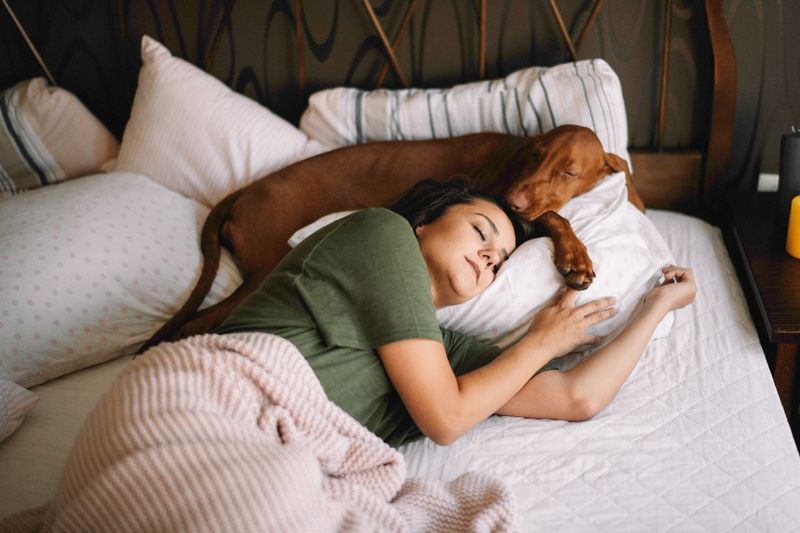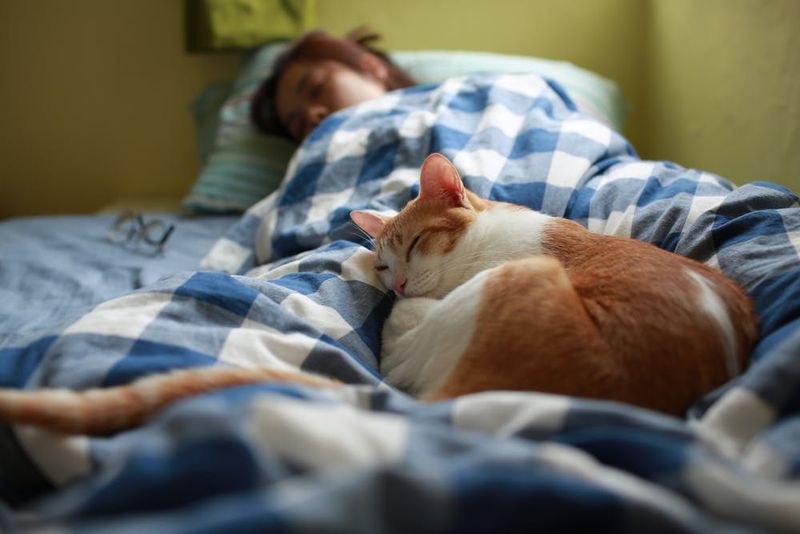They hog the blankets, snore like freight trains, and somehow take up half the bed—yet we let them in, night after night. Letting your pet sleep in your bed feels like the ultimate comfort… until it isn’t. There’s love, warmth, and bonding—but also fur in your mouth, midnight paw-punches, and the risk of never getting a full REM cycle again. Some people swear it deepens the bond. Others wake up with back pain and regrets. And science? It has plenty to say—both for and against the idea. So, should you cuddle up with your furry roommate, or finally reclaim your pillow? Let’s pull back the covers and find out.
Warmth and Comfort

Nothing quite matches the soothing warmth of a pet curled up beside you. Their presence provides a cozy ambiance, like a living, breathing hot water bottle. During chilly nights, their warmth can be a comforting balm, lulling you into restful sleep.
Yet, this same warmth can become overwhelming in warmer climates. Pets naturally generate heat, and the extra warmth might lead to restless nights. Balancing comfort and temperature can become a nightly negotiation.
Interestingly, some pet owners find that having their pet beside them reduces anxiety, offering emotional comfort alongside physical warmth.
Disturbed Sleep Patterns

Sharing your bed with a pet can mean disrupted sleep. Pets often have different sleep cycles, leading to unexpected wake-up calls.
Imagine waking up to find your cat kneading your chest or your dog needing a midnight walk. These interruptions can lead to fragmented sleep.
Nevertheless, for many, the joy of having a pet close by outweighs these disturbances. They adapt their routines to accommodate their pet’s needs, creating a unique bedtime rhythm shared with their furry companion.
Allergy Flare-Ups

For allergy sufferers, letting a pet in bed can trigger flare-ups. Dander and fur become part of your sleep environment, potentially leading to itchy eyes and sneezing fits.
This can be a significant drawback for those sensitive to pet allergens. Despite this, many pet owners choose to take antihistamines or use air purifiers to minimize allergy symptoms.
Interestingly, some individuals build a tolerance over time, finding their allergies lessen with prolonged exposure to their pets. The trade-off between cuddles and sniffles is a personal one, often driven by love and companionship.
Strengthened Bond

Allowing a pet to sleep in your bed can deepen your bond. The act of sharing a personal space fosters a sense of closeness and trust.
Pets perceive this as an act of acceptance into your ‘pack,’ reinforcing their loyalty and love.
This shared intimacy can enhance the emotional connection between you and your pet, making them feel like more than just an animal companion, but a cherished family member. This bonding experience can become a cherished nightly ritual for both parties.
Increased Security

Having a pet in bed can provide a sense of security. Dogs, in particular, are naturally protective, offering an extra layer of safety.
Their acute senses alert them, and subsequently you, to any unusual sounds or disturbances during the night. This can be reassuring, especially for those living alone.
On the flip side, this heightened alertness might lead to interruptions. Pets may bark or move around in response to noises, potentially disturbing your sleep. The comfort of security comes with its own set of challenges.
Limited Space

Pets, especially larger ones, can take up considerable space in bed. A large dog sprawled across the blankets can leave you clinging to the edge.
This battle for space can lead to discomfort and restless nights. Many find themselves rearranging their sleeping positions to accommodate their pet.
Despite this, the joy of having a pet close often compensates for any spatial sacrifices. Over time, owners and pets develop a shared sleeping arrangement that works for both, no matter how limited the space may be.
Hypoallergenic Benefits

For some, letting a pet sleep in bed can offer unexpected hypoallergenic benefits. Exposure to pet allergens in small, controlled amounts might bolster your immune system.
This is akin to low-level exposure therapy, potentially reducing allergy symptoms over time. While not a guarantee, some individuals notice a decrease in sensitivity to pet allergens.
This potential benefit is especially appealing to pet lovers who suffer from mild allergies but aren’t willing to give up their furry friend’s bedtime company.
Increased Hygiene Concerns

Pets bring the outdoors in, leading to increased hygiene concerns in bed. Muddy paws and shedding fur can quickly become part of your nightly environment.
This might mean more frequent washing of bedding and vacuuming to maintain cleanliness. It can be a chore balancing pet companionship with hygiene.
Despite the extra maintenance, many find the joy of having a pet close by outweighs the inconvenience. They establish cleaning routines to manage these concerns, ensuring a pleasant and clean sleep environment for both pet and owner.
Soothing Presence

The rhythmic sound of a pet’s breath or purr can be incredibly soothing. Many find this natural ‘white noise’ calming, aiding in relaxation and sleep.
Pets’ presence provides emotional comfort, helping to alleviate stress and anxiety. This can lead to improved mental well-being and a sense of peace.
While some might find it distracting, for others, it becomes a beloved part of their nightly routine. The soothing cadence of a pet nearby can transform bedtime into a truly restful experience.
Nighttime Adventures

Pets can bring an element of fun to bedtime. Dogs might burrow under blankets, creating a playful bedtime adventure.
These antics can be a source of amusement, adding a touch of whimsy to your routine. However, this can also lead to disrupted sleep.
Ultimately, the decision to allow such nighttime escapades comes down to personal preference. For many, the laughter and joy these moments bring are worth any minor inconveniences, making bedtime a time of shared fun and bonding.

